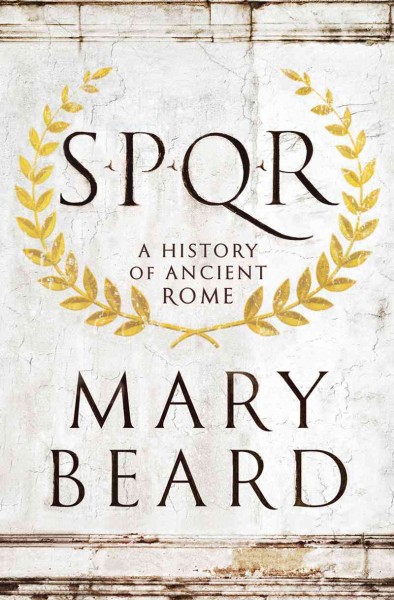 I love reading about pretty much any historical period. But I really love reading about Rome! I memorized toga styles once- it’s kind of an obsession. So I was excited that a Roman history book has been flying off the shelf this past month. I decided to try it, and I wasn’t disappointed. Remitto!
I love reading about pretty much any historical period. But I really love reading about Rome! I memorized toga styles once- it’s kind of an obsession. So I was excited that a Roman history book has been flying off the shelf this past month. I decided to try it, and I wasn’t disappointed. Remitto!
SPQR is short for “senatus populusque romanus” which means the “Senate and People of Rome”. It was a symbol that appeared often on Roman literature and legal documents, and refers to the governing body of the Roman Republic and its people. Beard chose a really apt title here, because I could actually divide this book in half. Half focuses on Roman life and culture. This was definitely the most fun part of the book. It is like a collection of stories that make the past come alive.
There are stories about pirates and Spartacus and his army fighting with kitchenware for weapons, and that strange tale about Plautus and Terence. There are also stories that challenge some of the famous annals of Rome. For example, do you remember that legend that Caligula declared war on Poseidon and commanded his armies to gather seashells from the ocean as war spoils? Beard tells us there may have been some confusion over the Latin word musculi, which can mean “shells” or “military huts”. His soldiers may have been destroying a military camp, not hunting for seashells.
The other half of the book explores the Senatus and all of Rome’s leaders. The way they constructed their government was a source of inspiration for America’s founding fathers, so this is a pretty interesting read regarding the earliest seeds of a republic. Many of the questions that people like Polybius and the Forum struggled with are still things we debate today. Dealing with “terrorists” outside the due process of the law is not just an issue that the US is struggling with. It’s really interesting to find that many political and social beliefs have been attempted before, and it very often offers insight to see how things may or may not have worked in the past. Beard doesn’t lean too hard on any real bias, a lot of the questions she poses are given with the historical evidence we have, and then the reader is free to make of it what they will.
I absolutely recommend this book to anybody wanting a more in-depth look at Rome. The writing isn’t too dry, or too romantic. The book feels very conversational; there isn’t a strict chronological order to it, so it feels like you sat down with a historian over drinks and asked them about some of the interesting bits of ancient Rome. I wouldn’t recommend this book to anybody that doesn’t have some knowledge going in. But it’s a little treasure trove, and definitely lives up to the hype.


Comments are closed.